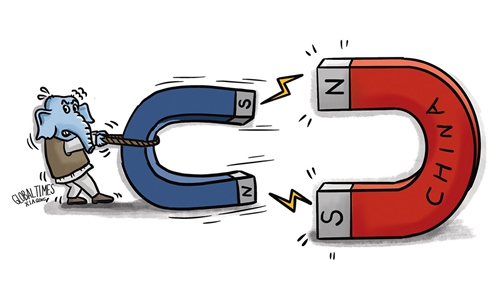
Illustration: Chen Xia/Global Times
It's possible for India to overtake Japan and Germany to become the world's third-largest economy after the US and China, but a prerequisite for achieving this ambitious goal in just a few years is that India needs to make the right choice between protectionism and opening up to the outside world.Indian Prime Minister Narendra Modi said on Tuesday that India's economy will be among the top three in the world in the next five years, Indian news agency PTI reported. Last year, reports from S&P Global and Morgan Stanley forecast that India's economy would become the world's third-largest by 2030.
Not a few economists believe the Indian economy will surpass Japan's and Germany's one day, thanks to India's large population, fast-growing middle class, growing digital infrastructure and energy transition. What they disagree on is how long it will take: five years, seven years, or even longer?
Compared with the predictions of economic institutions like S&P Global and Morgan Stanley, Modi seems more ambitious. He was quoted as saying: "In the coming five years, India will be in the top three economies - this is PM Modi's guarantee."
India's aspiration to become the world's third-largest economy in the next five years hinges on the rapid scaling up of its manufacturing sector to meet global demand. However, the investment required to achieve this will be nothing short of staggering, given that India wants to make itself the new global manufacturing hub.
India cannot rely solely on domestic enterprises. It must gain the favor of foreign manufacturers in order to become "the factory of the world."
Unfortunately, India is embracing trade protectionism. For instance, CNBC reported on August 4 that India imposed restrictions on the imports of personal computers and tablets, citing security reasons and the need to boost domestic manufacturing.
Protectionist ideology will hit foreign investment, hurting rather than promoting the development of the manufacturing industry, thus affecting India's ability to achieve its goal of becoming the world's third-largest economy in just five years.
The role of foreign investment in India's rapid economic growth in recent years is evident. The leapfrog development of many industries in India from scratch is inseparable from the contribution of foreign investment. If not for the continuous investment by the Chinese mobile phone industry and mobile phone companies in the Indian market, it would be difficult for India's mobile phone industry to have achieved its rapid development.
Through continually investing in the Indian market, Chinese enterprises have directly increased the mobile phone ownership and internet access rates in India, and they've also driven the rapid development of upstream and downstream enterprises in India.
However, with the success of Chinese mobile phone companies in the Indian market, India has begun to take unfair market measures to protect its domestic brands.
There's a lot of uncertainty in India's market and industrial policies. India has been adopting a range of unfair market measures, including incentives or subsidies, tax investigations, or non-tariff trade barriers, to protect its domestic industries. That has scared foreign investors. From 2014 to November 2021, 2,783 foreign companies registered in India closed their operations in India, according to media reports.
Moreover, instigated by the US' intensifying geopolitical push to build an industrial chain that excludes China, India has become even more unscrupulous in its protectionism. Chinese brands like BYD are still grappling with the so-called tax investigations in India, Reuters reported.
It is understandable that India wants to quickly revitalize its domestic manufacturing industries. But if India becomes accustomed to using unfair means to suppress companies from China or other countries to achieve its goal, India should carefully consider the price its economy has to pay in the very near future.
The author is a reporter with the Global Times. bizopinion@globaltimes.com.cn



